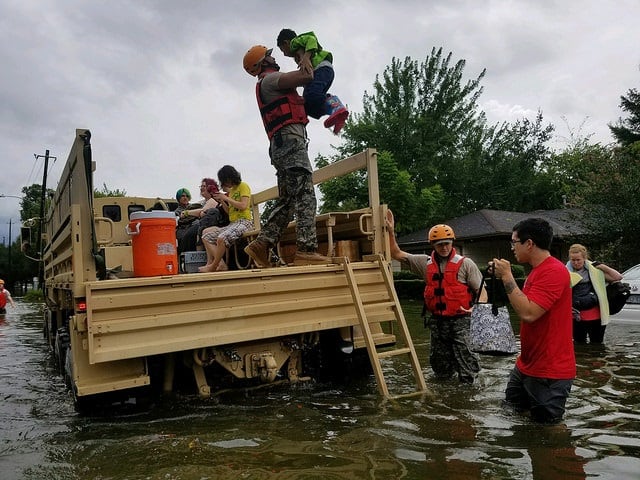An unknown number of service members and families have been affected by Hurricane Harvey in Texas and Louisiana, and all are eligible for some type of military-specific disaster relief.
Those families can seek emergency financial assistance through their service-specific military relief society: Navy-Marine Corps Relief Society, Army Emergency Relief, Air Force Aid Society or Coast Guard Mutual Assistance.
Those organizations are also accepting donations to help these military families affected by Harvey. Donors can earmark donations for Hurricane Harvey assistance.
As of Thursday afternoon, Navy-Marine Corps Relief Society had helped 42 clients with $21,628 in assistance. The NMCRS office at Corpus Christi in the Naval Health Clinic will reopen Friday at 9 a.m. The NMCRS website offers more information about donating, and where to get help.
Army Emergency Relief can provide a loan of up to $600 for evacuation and/or basic needs to active-duty soldiers and their eligible dependents affected by Harvey, including members of the Army Reserve and National Guard called on continuous federal active service for more than 30 days under Title 10 orders; retired soldiers; and surviving unmarried spouses and children of soldiers who died on active duty or after reaching retirement eligibility.
Learn more about AER offerings here. Air Force Aid Society information is available here.
Coast Guard Mutual Assistance also has information about assistance to Coast Guard families affected by Hurricane Harvey, including an application for assistance, on its website.
Those who aren’t located near a military relief society, or those who can’t reach one, or need help after hours, can get assistance through an agreement between the relief societies and the American Red Cross, which can be contacted at 877-272-7337.
The USO also is accepting donations to help troops who are deployed in the Harvey relief efforts, providing care packages and other relief programs. Visit the USO’s website for details.
RELATED

MORE WAYS TO DONATE
Many troops, family members and veterans also are seeking ways to help others in these communities devastated by the storm. Some options:
- The Office of Personnel Management approved a special solicitation of federal employees in the workplace to support victims of Harvey, it announced Wednesday. The solicitation ends Sept. 29. Each federal department, agency or component conducting the solicitation will be responsible for oversight, and each agency will decide which charity or charities will be allowed on federal property.
- The Federal Emergency Management Agency recommends visiting the website of the National Voluntary Organizations Active in Disaster for a list of major charities active in disaster work. These groups will be in the region doing relief and recovery work for years to come.
- The four charity rating organizations ― Charity Navigator, Charity Watch, Wise Giving Alliance, and GuideStar ― have compiled lists of some highly-rated charities that are doing Harvey relief work. Among those that are on all four lists are the American Red Cross, Direct Relief and Save the Children, but there are plenty of others that are on two or three lists. Some of the suggestions for local charities, on one or more of the lists, include the Houston SPCA, Houston Humane Society, Food Bank of Corpus Christi and San Antonio Humane Society.
BEWARE THE SCAMS
Get ready for numerous scamsters trying to get you to hand over your money under the guise of helping Harvey victims.
They may knock on your door, invade your email inbox, or put out a plea through social media. But if experiences during previous natural disasters are any indication, there will be plenty of people trying to take advantage of the desire to help those in desperate circumstances.
Do some due diligence before you donate if you want to make sure your hard-earned cash gets to people who seriously need it. Some individuals asking for money may have good, but may not know the right channels to get the help where it’s needed.
Some steps to keep in mind:
- Ask questions and do online research. Donate to charities you know with proven track records.
- Don’t write checks to individuals purportedly collecting for charity.
- Beware of social media claims. Don’t assume that charity messages posted are legitimate. Charity Watch notes that some people claiming to need help, posting on Facebook, GoFundMe or other sites may be doing so under false pretenses. “And even if they are victims, they may receive an unfairly large amount of aid,” Charity Watch notes.
- Before texting a donation, confirm the number with the source.
- Don’t click on attachments in emails purportedly soliciting money for Harvey relief.
Karen has covered military families, quality of life and consumer issues for Military Times for more than 30 years, and is co-author of a chapter on media coverage of military families in the book "A Battle Plan for Supporting Military Families." She previously worked for newspapers in Guam, Norfolk, Jacksonville, Fla., and Athens, Ga.




